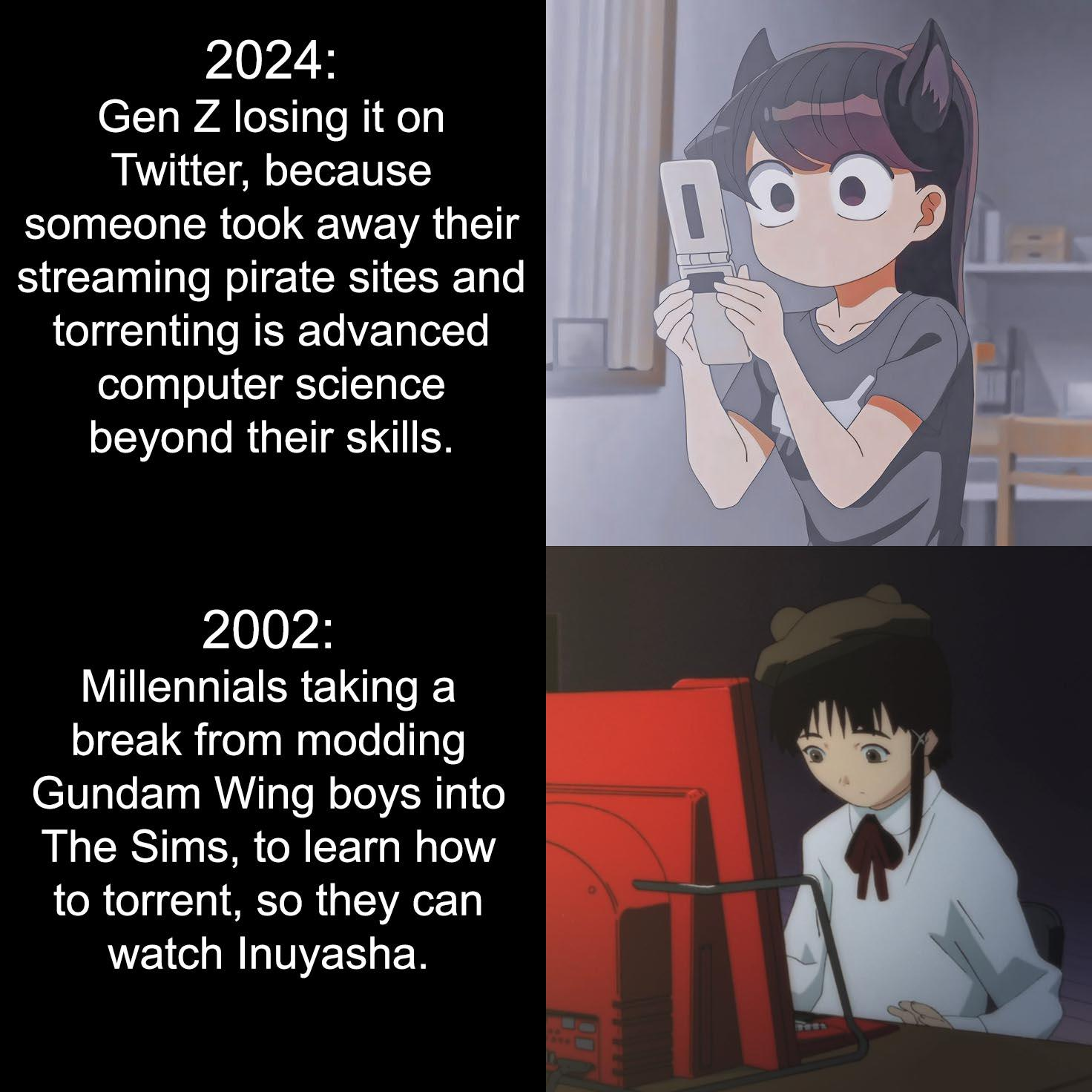Gen X: Oh, internet eh? So we don't need to keep copying umpteenth generation video cassettes of that dodgy pirate movie any more.
Piracy: ꜱᴀɪʟ ᴛʜᴇ ʜɪɢʜ ꜱᴇᴀꜱ
⚓ Dedicated to the discussion of digital piracy, including ethical problems and legal advancements.
Rules • Full Version
1. Posts must be related to the discussion of digital piracy
2. Don't request invites, trade, sell, or self-promote
3. Don't request or link to specific pirated titles, including DMs
4. Don't submit low-quality posts, be entitled, or harass others
Loot, Pillage, & Plunder
📜 c/Piracy Wiki (Community Edition):
🏴☠️ Other communities
FUCK ADOBE!
Torrenting/P2P:
- !seedboxes@lemmy.dbzer0.com
- !trackers@lemmy.dbzer0.com
- !qbittorrent@lemmy.dbzer0.com
- !libretorrent@lemmy.dbzer0.com
- !soulseek@lemmy.dbzer0.com
Gaming:
- !steamdeckpirates@lemmy.dbzer0.com
- !newyuzupiracy@lemmy.dbzer0.com
- !switchpirates@lemmy.dbzer0.com
- !3dspiracy@lemmy.dbzer0.com
- !retropirates@lemmy.dbzer0.com
💰 Please help cover server costs.
 |
 |
|---|---|
| Ko-fi | Liberapay |
Elder Gen-X: "I spent all weekend making this mix tape off of songs on the radio. I even got London Calling without the DJ!"
I was barely aware of the existence of pirate streaming services until they started cracking down on them. I torrent everything and run my own media server. (Millennial)
If you had real shitty internet back in the day (read 56k modem) and you liked to play russian roulette you would dump satellite traffic with a skystar2 DVB-S card. You never knew what you'd get realistically, found some true gems underneath mountains of coal in the day of (still) unfiltered internet.
so i do torrent stuff when i want to keep it, but the vast majoriy of my media i just stream from whatever shady site i happen to find it on first. it’s too quick and easy.
protip if you ever have trouble finding anything, just use yandex. russia doesn’t give a SHIT about copyright violations or DMCA complaints.
Yandex is extremely useful for finding obscure stuff that doesn't show up on the usual torrent sites.
The switch from using shit like Napster/LimeWire/eDonkey/etc to BitTorrent was fairly easy. It was the lack of the torrent app itself not having a file search in it that made things feel like they went backwards.
Before Napster and the rest, you'd do a web search for "warez" and sift through shady sites to find a working download link. After Napster, you'd just search for what you want in the app. I know there are torrent apps that do this now, but I don't know how wide of a reach they actually have. I still just go to a tracker's website and find things to magnet link.
As part of Gen Z I do not approve this message. When I was young I would stream movies from stream sites (to be fair I had no money to have VPN to torrent etc) but I have not visited one of those for like 5 years now since I learned more. Now not all gen Z is tech smart I see it in my friends and family members close to me age who are.... Dumb and worse they don't care to get better and think it's fine and that is what the problem is imo.
i don't get this 'generation gap' thing. There are also Milennials who are just as clueless.
You can always dive into the whole private tracker, sonarr/radarr + media server setup if you want superior quality or just to host your own files. But if you are happy with what streaming sites/apps provide that is fine too.
I for one am glad that piracy is easily accessible by anyone who has access to the internet.
generation "doesn't want to deal with petabytes of hard drive bullshit just to watch a show"
/side eyes dvd collection
Zoomer tech literacy is on average almost as poor as their actual literacy.
Through various stages of my life I have used torrents, streaming, Usenet, Napster, limewire, aol/IRC chat rooms, discord, and even google searches. You must adapt to whatever works.
I am sure you still have same number of those more advanced users, but now far more people have access to computers because they are cheaper and easier to use. That may be about it.
In the feature if you want a semblance of privacy, you will need to get fluent in Linux imho
Your chocie folks.
As for piracy, it ain't rocket science, once economic necessity kicks in, they will figure it out. That's the beauty of not having money
Zoomer here. The problem is really much worse than the meme suggests, and it isn't really a generational gap at all.
The computer power user is a dying breed.
Today's average computer user on windows, macos, or (heaven forbid) chromeos, knows nothing about software. They don't even know what software is. They can't install a program except through an app store. If you ask them which browser they use, they'll probably say "google." Furthermore, many perfectly functional people don't use any computer except their phone.
The tendency toward user-friendly systems is fundamentally a good thing, in my opinion. It has advanced the democratisation of computing and its advantages. But on the flip side, it has left a huge swath of the general public totally reliant on systems they neither control nor understand in the slightest.
I use Arch, btw. I put my own computer together - I bought and assembled the hardware components, I performed a minimal, headless installation of my operating system, and I meticulously scripted every personalisation of my window manager (I use dwm).
To me, computing comes easily, as second nature. I used so many systems from such a young age that I simply intuit the design language of user interfaces, whether I've used them or not. To me, they seem painstakingly designed to make this easy. Yet, because of my computer literacy, I am often called upon as tech support for my family and friends, from zoomers to boomers, and most of them seem like helpless infants when it comes to technology.
This is because the average user doesn't have to know or care what their system really does or how it really works. So, by the path of least resistance, a user learns the bare minimum to get what they want from their system. I'm not sure of anything that could change this reality.
As I said, it's not a bad thing that most of the population can now access the advantages computing delivers. But I do see this state of affairs as brittle and concerning, where people depend utterly on software they don't understand. This is often propriety software made by profit-driven corporations. The average user doesn't know or care that they don't actually control their software - because they don't need to. They don't know or care that their data is being tracked and sold, that their computer will update itself without permission or install programs they can't vet, and that alternatives to this exist.


